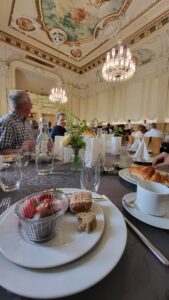Introduction
On Saturday, June 14, 2025, at 9 a.m. I found myself at Salle Pologme for a breakfast concert hosted by the Collegium Musicum.

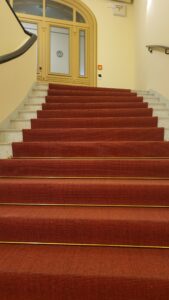
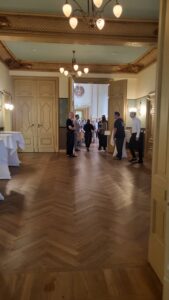
The path to the concert built up a lot of anticipation. As I made my way up the stairs of a building whose entrance you can’t easily identify when taking in the magnificence of the cobblestone streets that line the Augustplatz, I had no expectations but great hope that this concert would deliver.
Main
The first piece, a concert in A minor, struck me with its gentle beginnings, drawing each instrumentalist into the spotlight one by one as they soloed. The atmosphere transported me to a medieval festival—a time when jousting was a prominent spectacle. I noticed the use of caesuras in the music, which piqued my curiosity; this was the second particular time that I realized I needed to learn more musical terminology to articulate what I was experiencing. Nonetheless, feeling that way didn’t make me forget that music is abstract, as Ruth said. Hence, strings of letters cannot accentuate all perceptions and feelings.
As the last movement approached, it ended abruptly, leaving me wanting more, my anticipation for its continuation unfulfilled. Fortunately, I had recorded parts of the performance so I could revisit it later. There was a light-hearted moment when someone poked fun at the unique brass instruments, particularly one that resembled a trumpet.
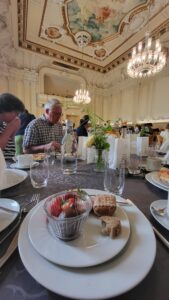
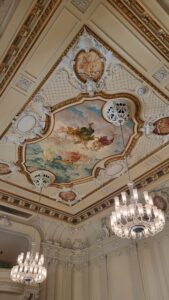
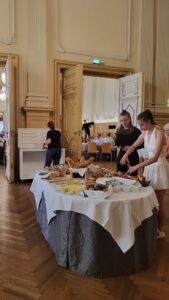
The next piece began with a singer whose voice, in harmony with the trumpet, evoked memories of serene scenes from In the Night Garden.
What is “In the Night Garden,” you may wonder?
Igglepiggle and his friends reside in a magical forest filled with vibrant, colorful flowers. They participate in numerous delightful activities and enjoy listening to bedtime stories together. To my 5-year-old self, they represent a charming ensemble of toys exploring the values of sharing, caring, and having fun.
It felt transported to untouched woodlands, complete with perfectly manicured lawns. The trumpet’s rhythm radiated joy, reminiscent of a celebratory cantata, a festive occasion worthy of a royal gathering from Disney or Nickelodeon, setin a medieval monarchy.
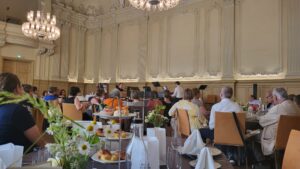
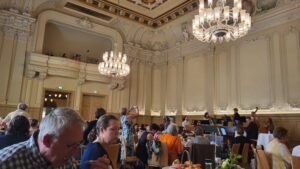
I regretted not recording this piece, but figured I might find it online later. Conversations flowed again, this time focusing on the instruments themselves. I discussed with Gabrielle the nuances of applause—when to applaud during a chamber performance versus a solo instrumentalist or a vocal piece.
The concluding piece featured a piano duet, which I thought sounded akin to striking metal. Were there numerous trills? Or perhaps I was merely noticing repeated phrases throughout? The music made me feel like I was on a holy adventure through an evergreen forest in the summer, along a richly colored clay path dotted with stones, rising to a rocky ledge. It might be a bit far-fetched from the actual theme of the song, but that’s how I processed it: as wonderful.
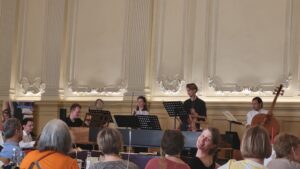
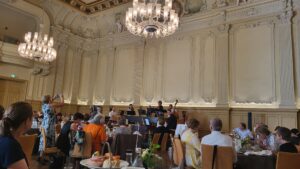
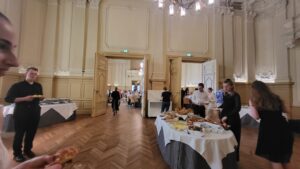
The long pauses in the music created a profound silence, allowing the audience moments to connect, as Gabrielle noted. These silences mirrored the breaks between collections of pieces performed.
As the next movement unfolded, I found myself envisioning scenes from the more gentle moments of a story about Dracula, adding a whimsical layer to the experience.
Koffee Cantata
Last but not least, I must mention the awesome Koffee Cantata. Firstly, I’d like to say that at times I find myself looking for particular sounds and beats to draw me into the complexities beyond the surface melodies and harmonies. Other times, it’s the way a performer gestures asthey sing or play an instrument.
The one time I was hooked by neither of those two was the moment they had the lead vocalists in the Koffee Cantata act out the entire relationship andinteraction between the mother and father. Those individuals may be students, but I’d give them a degree for the excellent performance they put up. Watching this made me contemplate more on the broader societal reflections I could draw from the story as I recalled how my extended family culture has transitioned from a highly patriarchal one to a more egalitarian one in the past 200 years, with girls being discouraged from pursuing beyond the 4th grade to my parents and myself motivating my sisters and coaching them on how to optimize their studying methods.
Additionally, the breakfast was delicious and wonderful. It reminded me of the ‘bread and circuses’ act policy of the Roman Empire – keeping the people fed and entertained at the same time. As the Koffee Cantata concert demonstrated, the entertainment doesn’t have to be gladiators and apex predators in a colosseum for the combination to work. Therefore, when the director mentioned they will keep having it again in the 2026 BachFest, I was more than thrilled for the people who will be able to experience such an eye-catching and substantive concert.
To conclude, my first time in the Salle Pologme was a wonderful four (4) hours I’ll never forget.
